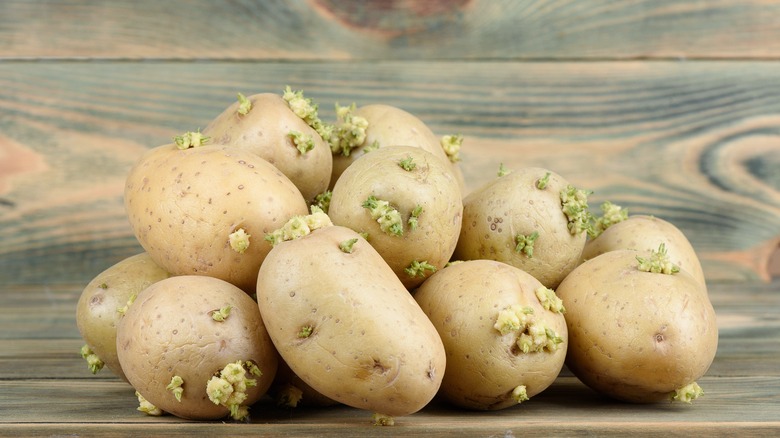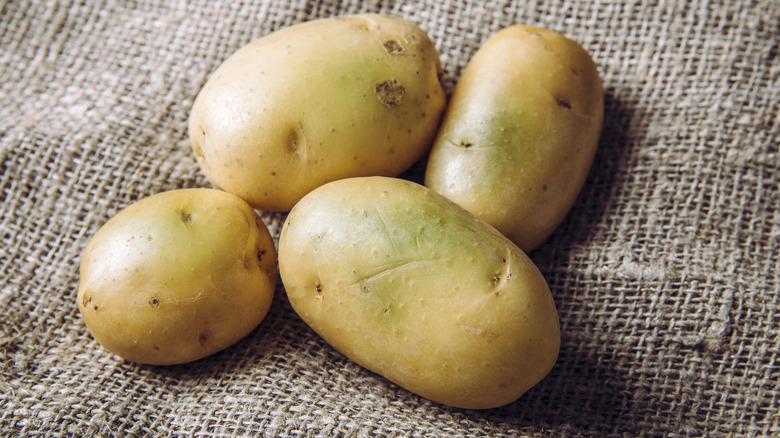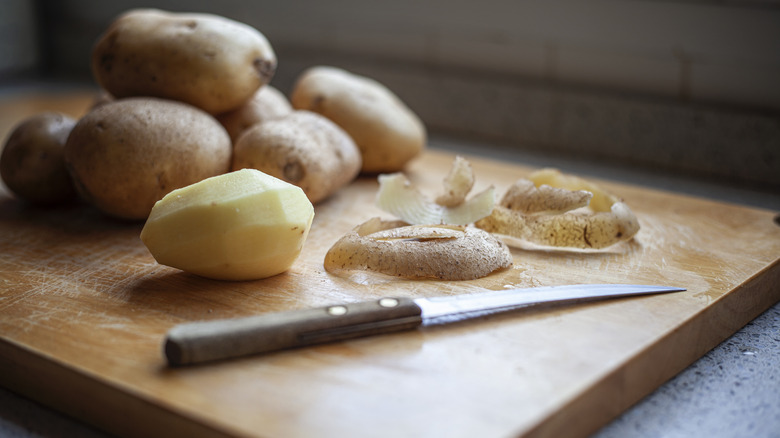Should You Eat Green Or Sprouted Potatoes?
Potatoes are trusty, hardy kitchen soldiers that you can turn to whenever you want to fill that gap in your menu with some comforting starchy deliciousness. You can buy and forget about them for up to a few weeks, and while storing your potatoes in a cardboard box can keep them fresh for even longer, spuds are generally unfussy about where they're kept. That is, of course, until you notice some with green patches or sprouts on them. Depending on how urgently you need them, you may wonder just how much of a risk you're taking by eating such spuds.
To get to the heart of the matter, we consulted with Personal Chef and Catering Director Silvio Correa. Between his Tropicali Brazilian Kitchen which serves Brazilian fusion cuisine and full-service BBQ catering service in Southern California, Correa knows the ins and outs of ingredients and when they're past their prime. He passes on those insights telling us when those still in the green won't do, and you're better off fetching a fresh sack.
How dangerous are green and sprouted potatoes and do they taste different?
While you should always think twice before eating green potatoes, the reason they start turning green is surprisingly un-ominous. It's because they contain chlorophyll, the same compound that makes plants green and converts sunlight to nutrients. Therefore, potatoes that are exposed to light are more prone to getting green patches. While chlorophyll itself isn't dangerous, its appearance in potatoes signals the presence of elevated levels of chemical toxins called glycoalkaloids (GAs). Regular levels of GAs are not harmful, but elevated levels can be and cause adverse health symptoms.
Those with compromised immune systems may be particularly susceptible to the high GA levels in green potatoes. They also have a bitter taste, which doesn't do your meal any favors and Correa recommends not using potatoes that are very green.
Sprouted potatoes also contain elevated GAs, especially in and around the actual sprouts.2gf Again, improper storage can lead to sprouting, and funnily enough, potatoes stored around apples can avoid sprouting for longer. However, sprouted potatoes are generally not safe to eat and Correa recommends not using potatoes that have reached this point or turned green. The one exception is if you spot potatoes that are just starting to green and sprout, in which case you may still be able to use them, albeit with some exceptions.
How to use green or sprouted potatoes?
Potatoes that are just past their prime can still be salvaged. Per Silvio Correa, "If the potato only has a few small sprouts or small green spots, you can remove those parts and use the rest. Make sure to cook it well before consuming." Since the toxins are concentrated around the green and sprouted areas, if only a small portion of the potato is affected, the skin and underlying flesh can be cut away.
It's also important to pay particular attention to cooking such spuds properly as studies (via the European Food Safety Authority) have shown that heat can significantly reduce GAs. Peeling and boiling potatoes in water can reduce GA levels by up to 65% and frying them can lower them by up to 90%. Microwaving and baking can also lower these levels, but to a lesser extent.
Once you've trimmed the green bits and sprouts, you can use the remaining potatoes to cook with. However, grilling is one place where Correa absolutely recommends using fresh potatoes since the difference in flavor and texture is much more noticeable than in other dishes. Therefore, skip any questionable potatoes when firing up the barbecue. Instead, you can use those old spuds to make your grill nonstick, before cooking up a delicious batch of fresh ones on it (just don't forget the foil). The heat from the grill also ensures the GAs from the green or sprouted potatoes you rub on your grill are largely neutralized.


